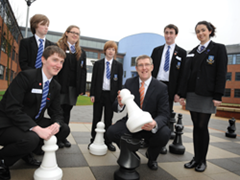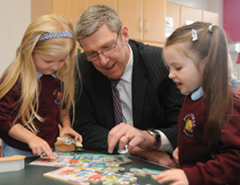John O’Dowd interview
 Education should be seen as an area-based service, rather than serving the needs of individual schools, John O’Dowd tells Meadhbh Monahan. He also views education as an economic skill in itself but remains cautious on creating a single, shared system.
Education should be seen as an area-based service, rather than serving the needs of individual schools, John O’Dowd tells Meadhbh Monahan. He also views education as an economic skill in itself but remains cautious on creating a single, shared system.
Northern Ireland needs to shift its focus from individual schools to viewing education as a service to be delivered, Education Minister John O’Dowd states. However, in his view, the province is not ready for a merger between its divided school sectors.
“We deliver education through schools and schools are vitally important to us but we can’t continue to build our education service on the needs of individual schools. It has to be on the basis of area planning,” the Minister tells agendaNi.
“We have developed over many decades an education system which was based on the needs of schools rather than the needs of education. I’m not blaming those who are in charge of schools or parents for that. That has been due to circumstances [and] government policy but now we have to change the mindsets on that.”
Having taken the portfolio in May 2011, O’Dowd recognises that “education is often looked at as an area where there is a lot of disagreement and rancour.” Divisions over academic selection and the delay in the formation of an Education and Skills Authority (ESA) have been the main bones of contention to date. Legislation to introduce the ESA has now been presented to the Assembly but most grammar schools are continuing to defy the Minister by carrying out unregulated entrance examinations.
O’Dowd’s ‘Putting Pupils First: Shaping our Future’ policy statement, last September, updated the ‘Every School a Good School’ policy introduced by Caitríona Ruane and announced viability audits to reduce the number of empty desks: currently 85,000. This, obviously, will also involve more school closures.
The Minister also stated that “the pattern of provision and investment must and will be dictated by the needs of education in the twenty-first century.” “The need is to constantly improve,” he remarks. “The education system needs to meet the needs of the economy going into the future [therefore] we need a flexible workforce: a workforce who are educated in a variety of skills, who can adapt to changing economic conditions.” The current education system “is beginning to get there” with the revised curriculum, which should provide up to 27 courses and “allows for a well-balanced educated young person.”
Following the viability audits, draft area plans were published by the five education and library boards on 5 July. These are open for public consultation until 26 October and the Minister will make his final decisions in December or January.
The viability audits have given the department up-to-date information on the condition of schools. “They on their own won’t be a deciding factor but they have given us and the public an informed picture,” O’Dowd explains. He wants all interested parties to read their local area plans in detail “not solely on the needs of their individual school but on the needs of delivering an educational service into that area and what’s the most sustainable way of doing that.”
Asked whether the draft area plans go far enough in terms of amalgamations, O’Dowd refuses to “make a judgement call on them yet.” He adds that, once finalised, the area plans “won’t be set in stone … but the concept of delivering education based on the needs of the area rather than an individual school is really important.”
Stalemate over academic selection will not hold up area planning, the Minister contends: “I’m still seeking ways to persuade people to move away from academic selection but I’m not going to solely concentrate in my term in education on academic selection.” Area planning presents an opportunity for parents, pupils and education providers to examine “alternative ways, rather than simply focusing on the needs of academic selection.”
He argues that the OECD’s Programme for International Student Assessment shows that systems without academic selection are operating better than ours. “Certain people are wedded to academic selection and will remain with it, no matter what the evidence shows,” O’Dowd comments. “But I do believe that there’s a body of public opinion and [opinion] within education who can be persuaded by the evidence to move away from it.”
 Single system?
Single system?
Around 90 per cent of Northern Ireland’s schoolchildren attend school each day without meeting children from the opposite community. The Shared Education Advisory Panel was formed in July and is due to report next year.
“I don’t think we will achieve a single education system from this panel but I’ve told them to be bold and challenging, not only to myself but to the various sectors out there, and bring back a report that gives the basis for an informed conversation and debate going into the future,” O’Dowd states.
Northern Ireland’s education system reflects its society, he notes. However, the Minister argues: “I don’t blame our education system for the faults in our society so I think it’s somewhat unfair to solely concentrate on the education system and say: ‘If we had a single education system or an integrated system, we wouldn’t see the problems in our society.’ I don’t believe that.”
The advisory group’s report should result in more sharing between sectors, sectors challenging themselves on good relations and a stronger focus on delivering a good education system.
If the education system were to be designed now with a blank sheet of paper “you wouldn’t have the one you have today,” O’Dowd reflects. However, the Minister refuses to be drawn on what he would envisage if he had a blank sheet of paper.
Instead, he comments: “My vision may be different from other people’s vision of what education should be like. My job as Minister is to manage education through a series of programmes of change. I have a system to manage and work with and I’m going to do that.”
When pressed on the fact that, as Minister for Education, he is expected to have a vision and to implement that vision, he replies: “Of course, my role is to have a vision. I also have to work within the realities of the circumstances I have.”
O’Dowd concedes that he could “set out a vision that challenges all the sectors out there and makes people feel very, very uncomfortable within our education system.” However, he believes that that would lead to “unnecessary difficulties” and the focus being taken away from “the delivery of education for our young people.”
Sinn Féin’s southern Education Spokesman Seán Crowe has voiced support for Irish Education Minister Ruairí Quinn’s plans to remove Catholic patronage from primary schools. However, Sinn Féin supports the status quo north of the border.
When challenged on this policy difference, O’Dowd states: “The North has a different history and its education system has evolved differently, particularly since partition.” He adds: “I could turn around and say: ‘Right, I want a single education system’ but could I at this stage honestly say that I would bring the community with me? I don’t think so.”
 Economic impact
Economic impact
Acknowledging that Northern Ireland does not have a world class education system “is a strange thing for a Minister to admit to” but he thinks that majority of people share that view with him. The Executive’s Economic Strategy notes that “a world class education and skills system is critical for economic growth.”
Ministers agree on the need for early intervention and to tackle the relationship between socio-economic disadvantage and educational under-attainment.
To complement this, O’Dowd plans to finalise the early years strategy in November. Preparation has taken longer than expected as the consultation resulted in conflicting views.
Making progress on science, technology, engineering and maths has often been seen as part of the Department for Employment and Learning’s remit but is becoming an increasingly high priority for the school system as well.
The Minister theorises that “education in itself is a skill” in that it is equipping young people with skills for the workforce. Education’s job is “to give young people the educational skills to make an informed career choice.” He adds: “That may be going on to a university or [a college of] further and higher education or may be going into the trades.”
His own education pathway, from a small rural primary school in Lawrencetown, outside Banbridge, to Lismore Comprehensive School in Craigavon, taught him that he didn’t take the advantage of education that he should have. He later studied at Newry Catering College and worked as a chef.
His other main influences included growing up in Ireland, his mother who was “a great believer in social justice,” and his father who had great knowledge of world history and was an avid reader. “But education takes many different forms,” he comments. “I always had a hunger for knowledge, I always enjoyed reading, and I have a great interest in politics and history. Through many of those elements I have garnered knowledge, maybe in a less formal way than others.”
That experience, in his view, shows the need “to ensure that young people are given every opportunity to achieve what they can within the education sector.”
Profile: John O’Dowd MLA
Born in 1967, John O’Dowd grew up outside Lurgan and was a councillor on Craigavon Borough Council for 13 years (1997-2010). He has been Sinn Féin’s MLA for Upper Bann since 2003 and, in the last Assembly, chaired the Public Accounts Committee and was his party’s Education Spokesman.
On his ambitions, he says that he doesn’t have a ‘political career’ despite being viewed as a potential future MP for Upper Bann. He stood in the 2005 and 2010 general elections. “Clearly the party has ambitions to take the Westminster seat in Upper Bann and I think it can do that,” he says. “That’ll be a decision taken in the future as to who stands for that seat.”
Married with two young children, he enjoys spending his free time with them: “They are a great way of bringing you back down to earth with a thud.”





